Finding engaging activities for preschool kids can be a challenge for many parents and educators. Educational games are one of the best ways to combine fun and learning for young children. These games stimulate cognitive skills, promote language development, and foster social interactions, making them invaluable tools for early childhood education.
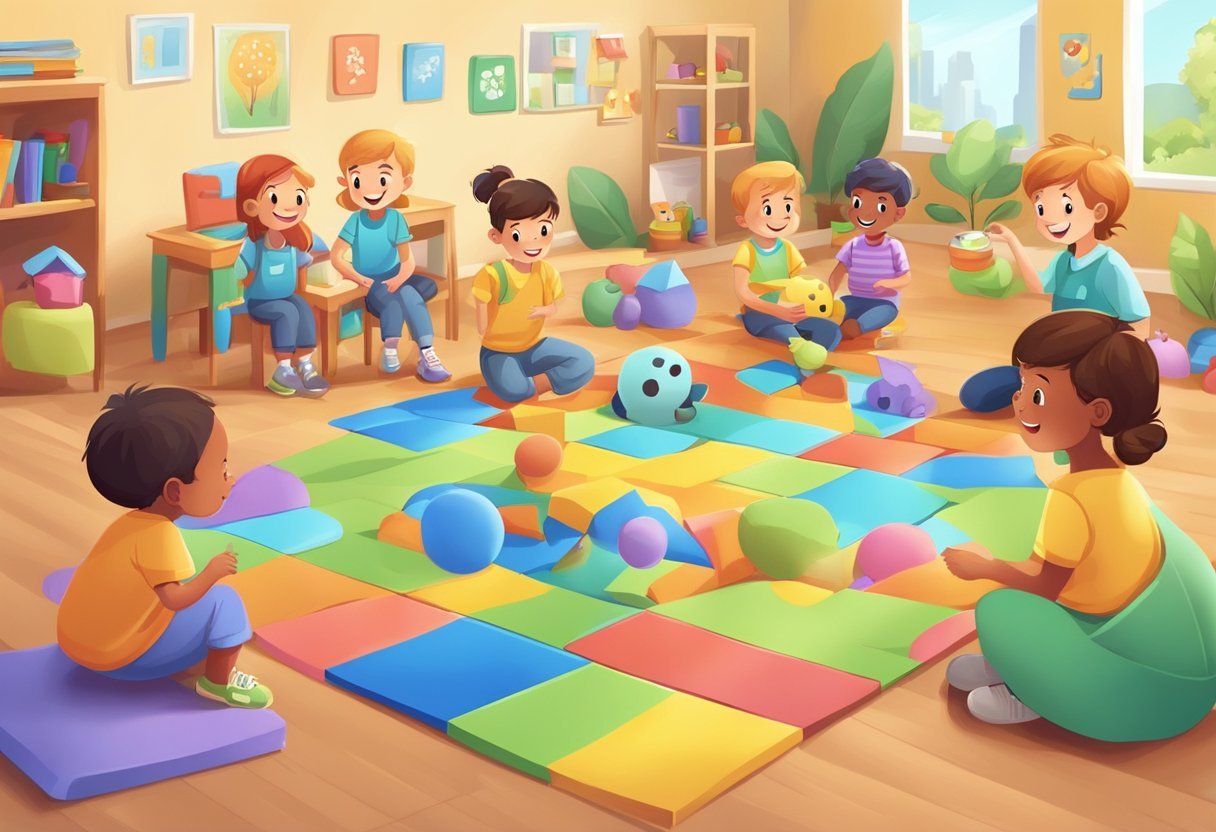
Educational Games
The Best Educational Games for Preschool Kids: Engaging Learning Activities for Young Minds
When selecting the best educational games, it’s important to consider their ability to engage children while promoting key developmental skills. Games that focus on cognitive tasks, fine motor skills, and creativity can effectively prepare preschoolers for future learning experiences. Parents can find a wide variety of games that cater to different learning styles and interests.
As kids explore these educational games, they not only learn important concepts but also develop essential skills that will benefit them in the long run. This article highlights some of the best educational games that fulfil these criteria and offer children a fun way to learn and grow.
Key Takeaways
- Educational games are crucial for cognitive and social development in preschoolers.
- Selecting games that engage multiple skills enhances learning experiences.
- A variety of games can support different aspects of a child’s growth and creativity.
Benefits of Educational Games for Preschoolers
Educational games offer various advantages for preschool children. They support cognitive development, helping kids learn important skills while they play.
Skill Development
Games encourage the use of logic, memory, and strategy. For example, matching games enhance memory retention and sorting activities teach logic.
Social Skills
Playing games also helps kids interact with their peers. They learn how to take turns, share, and communicate effectively. This builds teamwork and friendship.
Emotional Growth
Educational games can help children express their feelings. They experience winning and losing in a safe environment, which teaches them about emotions and resilience.
Hands-On Learning
Many educational games are tactile. For instance, building blocks can improve fine motor skills as children stack and balance shapes. This physical interaction aids comprehension.
Fun and Engagement
Games are enjoyable for kids, making learning exciting. When children are engaged, they are more likely to retain information and develop a love for learning.
Variety of Learning
From letter recognition to simple math, educational games cover multiple subjects. They can be tailored to a child’s interest, making it easier to grasp new concepts.
By incorporating educational games into playtime, parents can provide meaningful experiences that enhance their child’s development.
Criteria for Selecting the Best Games
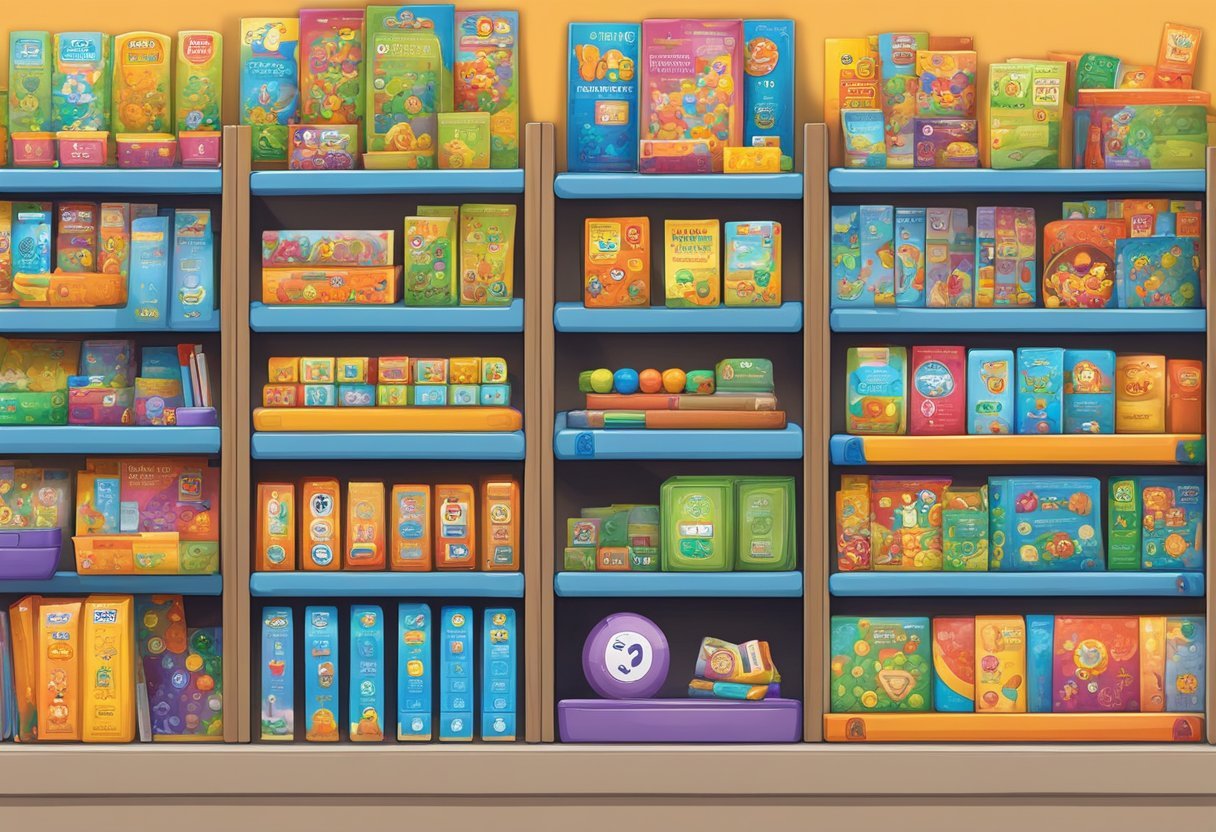
Educational Games
When choosing educational games for preschool kids, several important criteria stand out. These factors ensure that the games are suitable, beneficial, and safe for young learners, enhancing their educational experience while keeping them engaged.
Age-Appropriateness
The first step in selecting an educational game is ensuring it is age-appropriate. Preschool kids typically range from ages 3 to 5. Games should match their developmental stages and cognitive abilities.
Consider games that feature simple instructions and mechanics. Activities that involve colour recognition, basic counting, and alphabet learning are suitable. The right game should encourage skill-building without causing frustration.
Parents and educators should also think about the themes and topics involved. Games that resonate with children’s interests help them stay engaged while learning effectively.
Educational Value
Next, the educational value of a game is crucial. This means the game should promote learning in areas like literacy, math, or problem-solving.
Games that encourage critical thinking and creativity tend to be more effective. For instance, puzzle games can enhance spatial awareness and logic skills.
Additionally, games that integrate storytelling can improve language skills. They allow children to expand their vocabulary while having fun. Look for games that align with educational standards, ensuring they support what kids learn in preschool.
Engagement Level
A high engagement level is necessary for keeping preschool children interested. Games should be interactive and captivating, allowing kids to explore their imagination.
Look for features like vibrant colours, exciting sound effects, and fun characters. Games that incorporate movement or physical play tend to hold attention longer.
Also, multiplayer options can enhance social skills. Kids enjoy playing with friends or family, making learning a shared experience. Engaged players are more likely to retain information and enjoy the learning process.
Ease of Use
The ease of use for young players is another essential criterion. Games should have simple controls and intuitive design.
Parents or teachers should be able to explain how to play the game quickly. If a game is too complex, it may lead to confusion or frustration.
It is beneficial if games come with clear instructions and visual aids. This allows children to understand the objectives without constant adult intervention. A game that is easy for kids to navigate encourages independence and builds their confidence.
Safety and Privacy
Finally, safety and privacy are critical when selecting educational games. Parents must ensure that games do not expose children to harmful content.
Check if the game is free from violence, inappropriate language, or adult themes. Reviewing user feedback can also provide insight into a game’s safety.
Many games collect data, so it is essential to understand the privacy policies. Look for games that prioritize safety, offering secure environments for children to learn and play.
Ensuring these criteria are met can help select the best educational games for preschool kids.
Top Rated Games for Cognitive Development
Cognitive development is crucial for preschoolers as it helps them learn problem-solving skills and improves memory. Two types of games stand out for boosting these abilities: puzzle-solving games and memory-matching games. Each provides unique benefits to young learners.
Puzzle Solving
Puzzle-solving games are excellent for enhancing critical thinking and spatial awareness. These games encourage children to think creatively and develop solutions to reach a goal.
Types of puzzles include:
- Jigsaw puzzles: Help with shape recognition and hand-eye coordination.
- Logic puzzles: Develop reasoning skills as kids make connections to solve problems.
Additionally, engaging with puzzles often involves teamwork, promoting social skills. The sense of accomplishment kids feel upon completing a puzzle can also build their confidence.
Memory Matching
Memory matching games are effective in improving memory retention and mental agility. These games require children to remember the location of different cards or images.
Benefits of memory matching:
- Increases attention span: Kids focus and concentrate while playing.
- Enhances information retention: Regular practice helps solidify memory skills.
Games can vary from simple card matching to themed games featuring favourite characters, making them more engaging. Playing with friends or family can also make these games more enjoyable and foster social interaction.
Language Learning Games
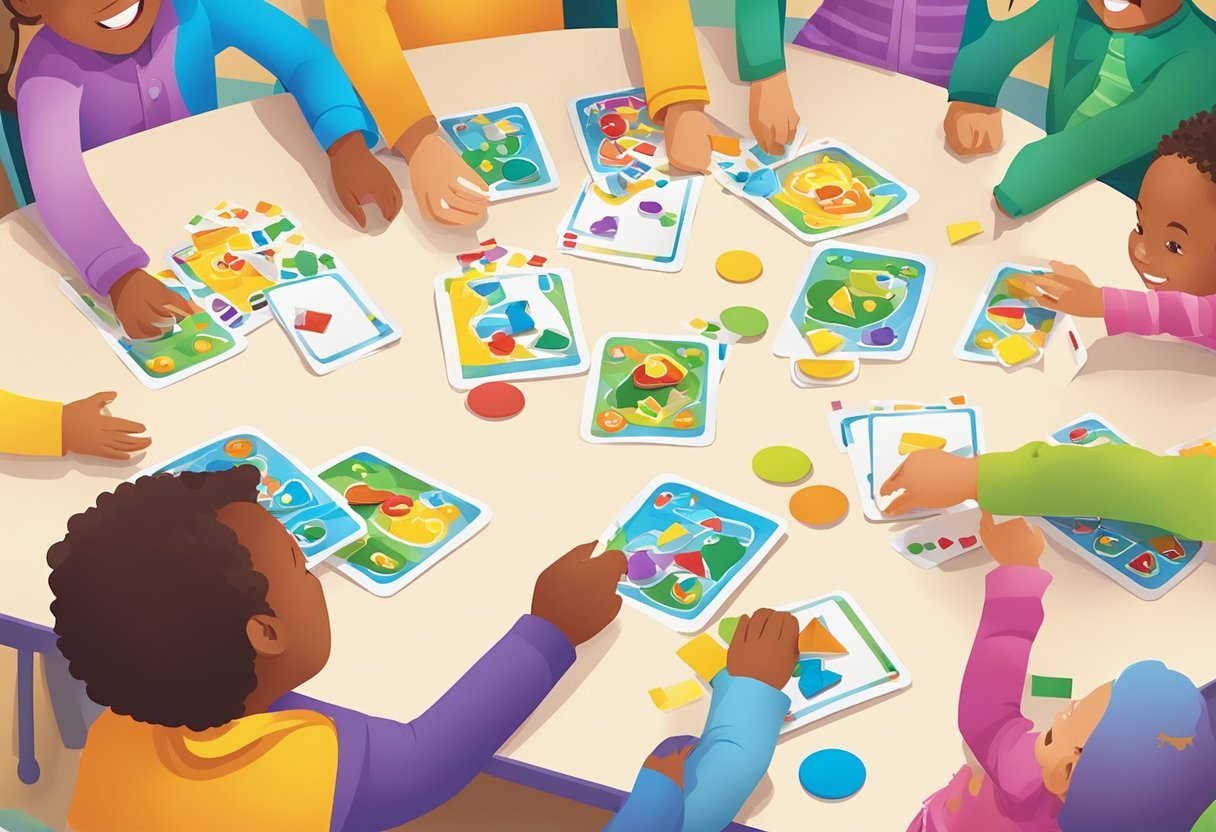
Educational Games
Language learning games are essential for preschool kids as they make learning fun and engaging. These activities help children expand their vocabulary and enhance their phonics and reading skills in a playful environment.
Vocabulary Building
Vocabulary-building games focus on expanding a child’s word bank. These games often use visual aids to help children associate words with images.
Examples of vocabulary games include:
- Picture Matching: Children match words to pictures. This reinforces connection and recognition.
- Flashcards: Using flashcards, children can learn new words through repetition and visual stimulation.
Games like “I Spy” encourage kids to find objects and identify them verbally. These activities not only teach words but also improve listening skills and cognitive development. Regular practice keeps learning enjoyable and effective.
Phonics and Reading
Phonics and reading games help children grasp the sounds that letters make. This skill is crucial for reading at an early age.
Popular phonics games include:
- Sound Sorting: Children sort objects by their starting sounds, teaching them to recognize phonetic sounds.
- Phonics Bingo: In this game, children listen for sounds and cover the corresponding letters on their bingo cards.
Using apps like Mondly, kids can learn phonics through interactive lessons. These activities reinforce letters’ sounds while maintaining a fun learning atmosphere. Engaging with phonics games prepares children for early reading and boosts their confidence in language skills.
Best Math Games for Preschoolers
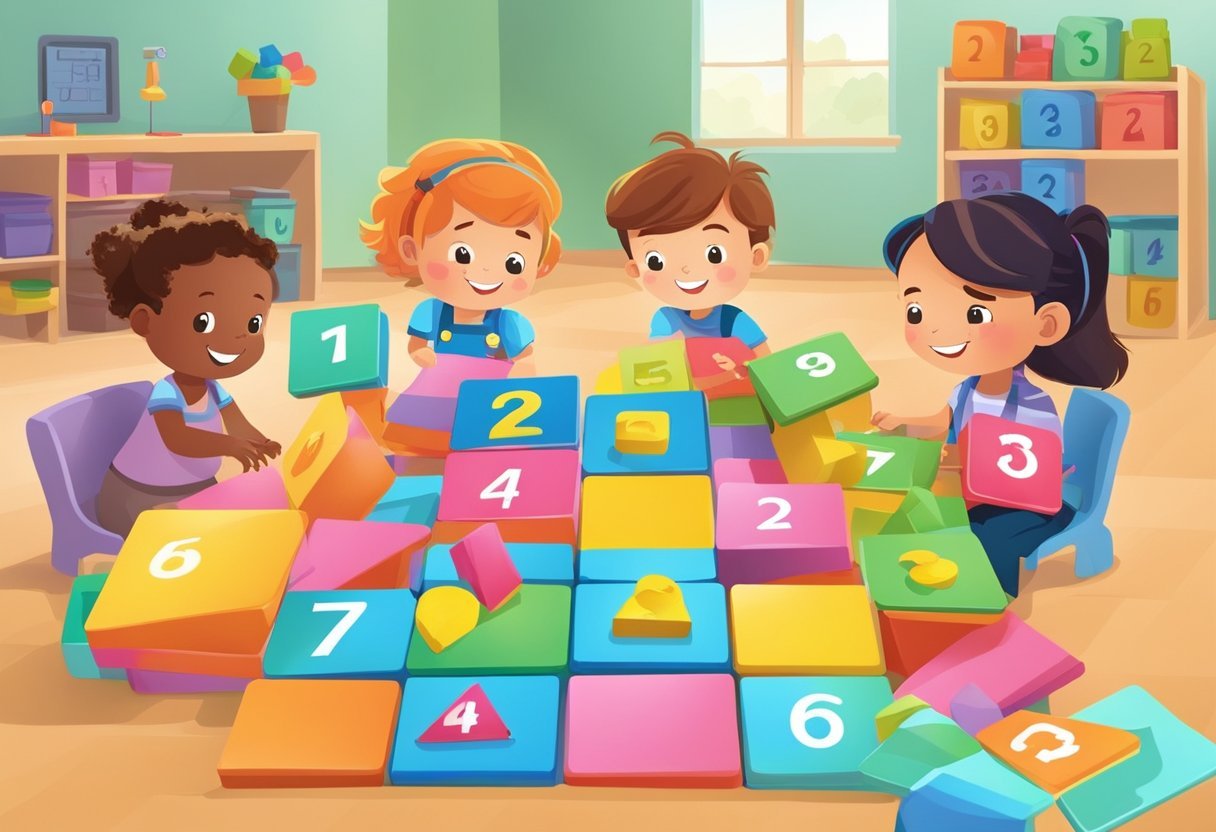
Educational Games
Preschoolers can develop important math skills through engaging games. These activities can enhance their understanding of numbers and basic math concepts while keeping learning fun.
Number Recognition
Number recognition is a crucial skill for preschoolers. It allows them to identify and understand numbers, which lays the foundation for more advanced math concepts.
Games that focus on number recognition often involve matching numbers to objects or sounds. For example, children might play a game where they match cards with different numbers to groups of items, like blocks.
Websites like Education.com offer a variety of games that help with number recognition. These games are interactive and visually appealing, capturing children’s attention while they learn.
Basic Math Skills
Preschool games that teach basic math skills can cover addition, subtraction, sorting, and understanding shapes. Such activities are designed to be enjoyable and educational at the same time.
For example, simple board games can allow children to practice counting spaces to move their pieces. This helps reinforce both counting and the concept of addition.
Online platforms like SplashLearn offer tools where preschoolers can learn shapes and practice sorting objects through fun gameplay. These activities encourage children to explore mathematical concepts while playing.
Incorporating various types of math games helps foster a love for learning and makes foundational math skills more approachable for young learners.
Games for Developing Fine Motor Skills
Fine motor skills are crucial for preschoolers as they help with tasks like writing, buttoning, and using utensils. Engaging children in games can make skill development enjoyable.
1. Stringing Beads
Children can practice their grip by stringing beads on a pipe cleaner. This activity enhances dexterity and coordination. It can also introduce colours and patterns.
2. Pass the Parcel
This game involves passing a wrapped parcel around a circle while music plays. When the music stops, the child holding the parcel removes one layer of wrapping. It promotes hand movement and social skills.
3. Scoop and Transfer
Using small tongs, kids can scoop items like pom-poms from one bowl to another. This task strengthens grip strength and encourages hand-eye coordination.
4. Fruit Loop Towers
Children can stack Fruit Loops on a piece of string or a pipe cleaner. This fun activity improves pincher grasp and concentration while being a tasty treat.
5. Twisting and Turning
Twisting chenille stems into different shapes helps develop fine motor control. Children can practice bending and shaping, which enhances their manual dexterity.
Incorporating these games into daily play can significantly benefit preschoolers’ fine motor development. They are simple to set up and can be done with items easily found at home.
Creative Games for Artistic Expression

Educational Games
Creative games play a crucial role in helping preschool kids explore their artistic talents. These activities encourage self-expression and nurture imagination through playful engagement.
Drawing and Painting
Drawing and painting are foundational artistic activities that foster creativity in young children. Simple tools like crayons, coloured pencils, and washable paints allow children to express their thoughts and feelings on paper.
Preschoolers can explore various techniques, such as finger painting or using sponges to create textures. Encouraging them to draw from their imagination or from real-life objects helps build observational skills and confidence.
Interactive group activities, like mural painting, promote teamwork and collaboration. Parents or teachers can set themes for the art, which helps guide children while still allowing freedom.
Art projects can be enhanced with storytelling, where children create illustrations to accompany their narratives. This combination of art and language learning can spark creativity and improve communication skills.
Music and Rhythm
Music and rhythm activities are vital for developing a child’s creative expression. Songs with repetitive patterns and simple melodies help preschoolers engage with music through clapping, singing, or using instruments.
Instruments like tambourines, maracas, and xylophones introduce children to sounds and rhythms. These instruments can be used in group settings to teach coordination and cooperation.
Movement games that involve dancing to music encourage physical expression, allowing children to connect their feelings with movement. Parents and teachers can create activities where kids make up their dance moves, promoting improvisation.
Integrating storytelling with music can enhance the experience, inviting kids to act out parts of a story or create sound effects. This method encourages active listening and further enriches their imaginative play.
Science Exploration Games
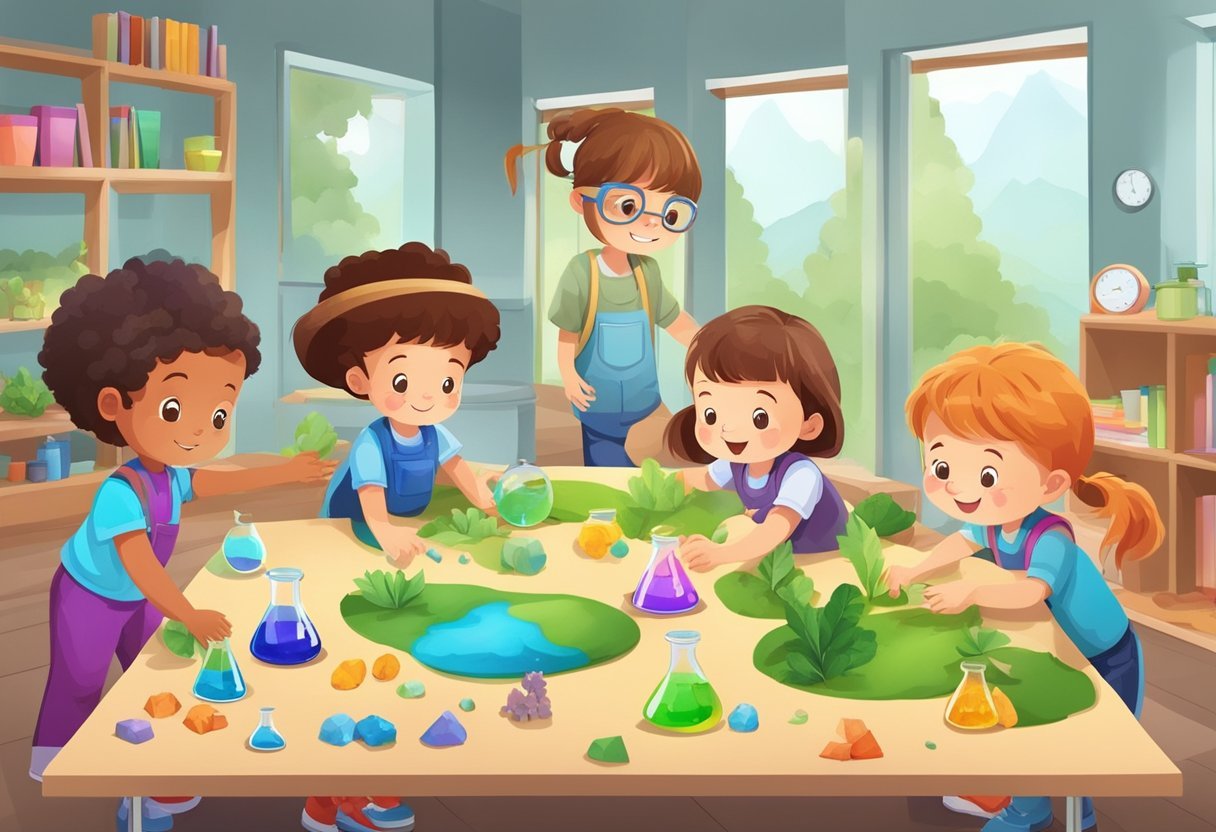
Educational Games
Science exploration games engage preschool kids in fun and educational activities. These games help children discover basic scientific concepts through play.
Examples of Science Exploration Games
- Magic Milk Experiment: Kids can mix food colouring with dish soap in milk. This activity demonstrates surface tension and chemical reactions in a fun way. A simple and engaging experiment can be found at We Are Teachers.
- Dinosaur Fossils: Playing with salt dough to create dinosaur fossils allows children to dig and match. This game not only introduces basic geology but also sparks interest in dinosaurs. More details are available at Taming Little Monsters.
- PBS Kids Science Games: Here, children can grow vegetables and build stable bases on different planets. The games feature popular characters that make learning enjoyable. Visit PBS Kids for more fun games.
Benefits of Science Exploration Games
- Encourages Curiosity: These games foster a sense of wonder about the world.
- Promotes Critical Thinking: Children learn to ask questions and explore solutions through play.
- Builds Social Skills: Kids often play these games in groups, promoting teamwork.
Science exploration games provide a hands-on way to learn and enhance preschool education.
Navigation and Spatial Awareness Games
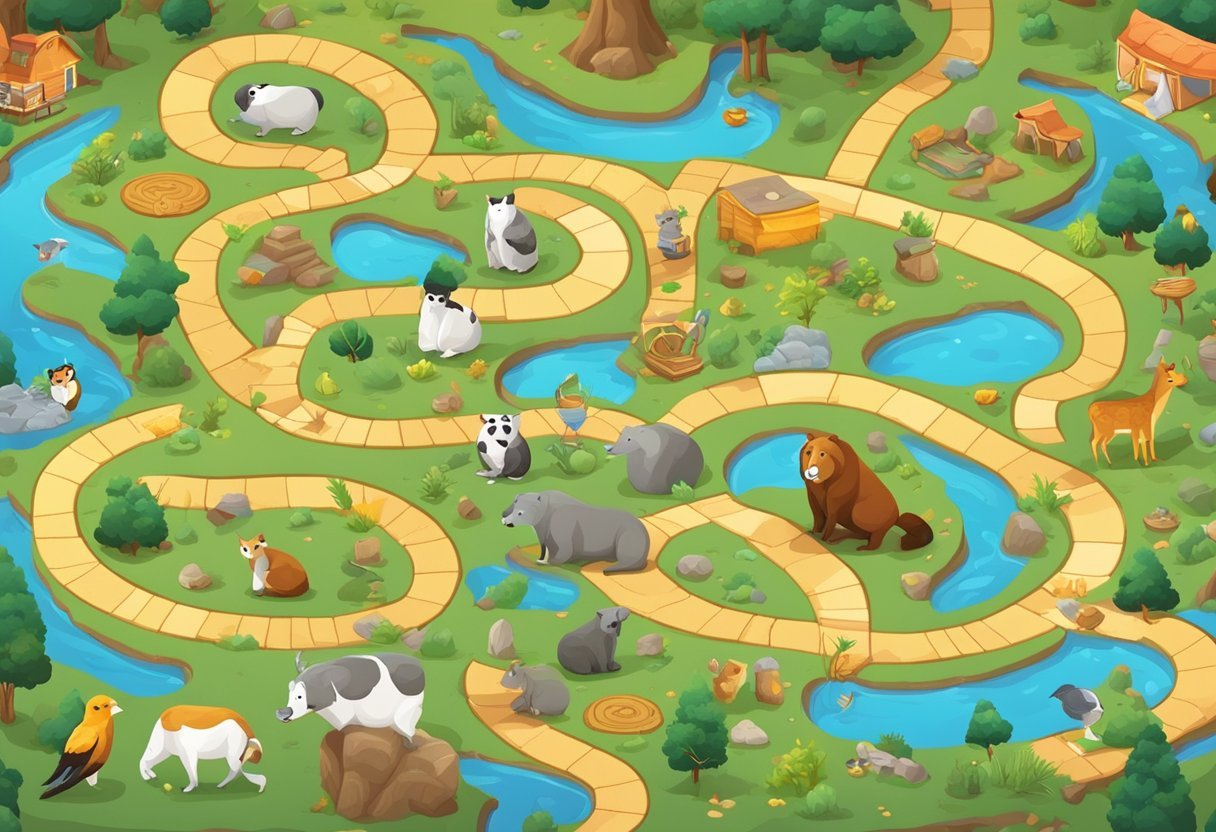
Educational Games
Navigation and spatial awareness games help preschool children develop important skills. These games support understanding of positions, directions, and space.
Popular Games
- Obstacle Courses
Children can navigate through a set course using tunnels, cones, and more. This activity promotes gross motor skills and spatial awareness. - Simon Says
This classic game encourages listening and following directions. It helps children learn about their body movements in space. - Treasure Hunts
Creating a map for kids to find hidden items can be fun. They learn to follow directions and understand spatial relationships.
Engaging Toys
- Building Blocks
Playing with blocks allows children to create structures. It enhances their spatial reasoning as they figure out how pieces fit together. - Puzzles
Shape sorters and jigsaw puzzles improve spatial awareness. They require kids to think about how pieces connect.
Benefits of These Games
- Develop Motor Skills
Engaging in these activities helps improve both fine and gross motor skills. - Enhance Problem-Solving
Kids learn to solve puzzles and navigate spaces, boosting critical thinking.
Incorporating these games into playtime can significantly contribute to a child’s development in a fun and interactive way.
Social and Emotional Learning Games
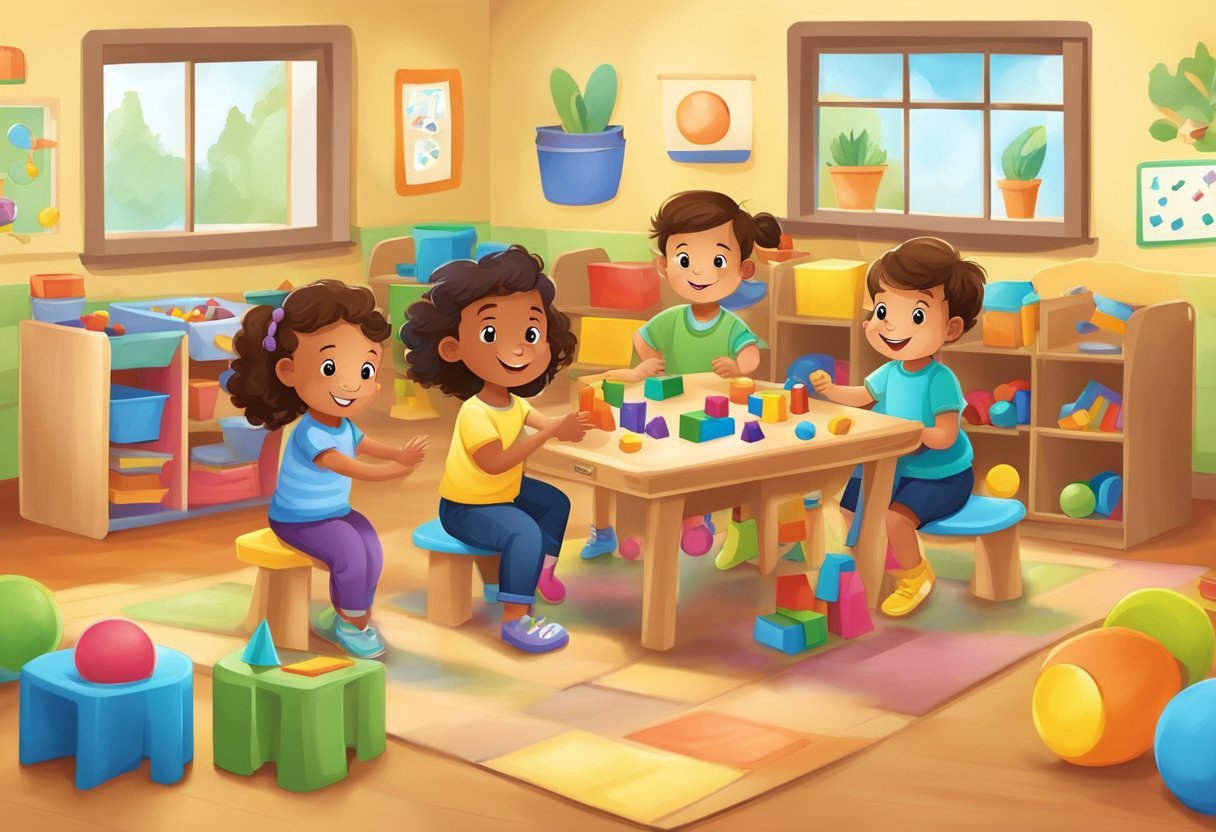
Educational Games
Social and emotional learning (SEL) games help preschool children develop crucial life skills. They can learn empathy and teamwork through fun activities that encourage interaction and understanding.
Empathy Building
Empathy-building games allow children to understand and share the feelings of others. These activities often involve role-playing or storytelling. For instance, children can take turns being characters in a story, which helps them see different perspectives.
A simple activity is the “Feelings Flashcards” game. Educators show cards with facial expressions, and kids guess the emotion. This encourages discussion about why someone might feel a certain way.
Another effective game is “Empathy Charades.” In this game, one child acts out a feeling while others guess it. This not only makes them aware of emotions but also promotes open conversations about feelings.
Cooperation and Teamwork
Cooperation and teamwork games teach children how to work together. These activities enhance communication skills and build trust among peers.
One popular game is “Team Scavenger Hunt.” In this game, children must find items together based on clues. It teaches them to listen and collaborate to achieve a common goal.
Another effective game is “Building Blocks Relay.” In this activity, teams race to build a tower using blocks. It requires planning and cooperation, as they must coordinate their actions.
Using these games, preschoolers can learn how to support one another and share successes. These skills are essential as they grow and interact with others in various settings.
Physical Education Games for At-Home Fitness
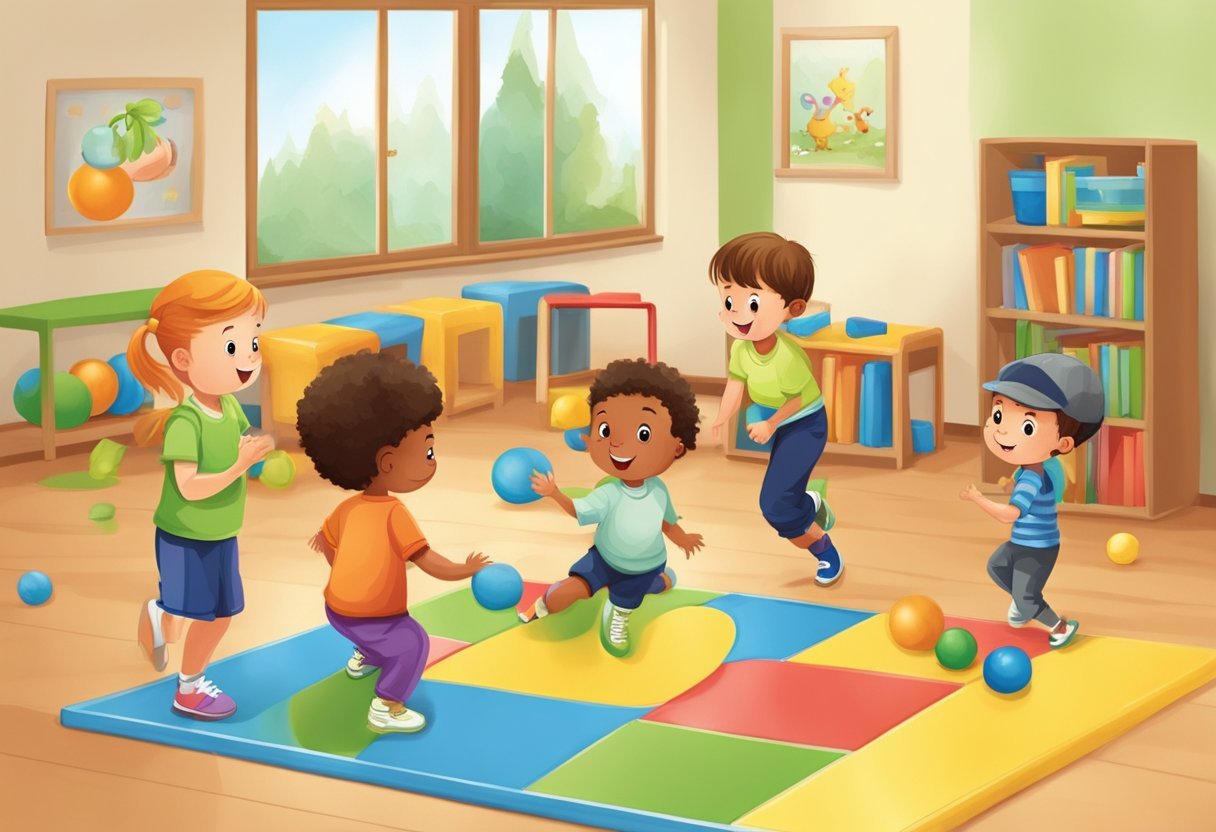
Educational Games
At-home fitness for preschool kids can be fun and engaging. Incorporating activities like yoga, stretching, dance, and movement helps children develop their physical skills while enjoying themselves.
Yoga and Stretching
Yoga promotes flexibility, balance, and mindfulness in preschool kids. Simple poses like “Tree,” “Warrior,” and “Child’s Pose” can be introduced. Kids can practice holding each pose for a few breaths, which encourages focus and relaxation.
Stretching before and after physical play is essential. Parents can guide children through basic stretches like reaching for the sky or touching their toes to improve flexibility. A stretching routine can be done playfully, using animal movements like “Cat-Cow.” This not only keeps them engaged but also promotes body awareness.
Dance and Movement
Dance is a vibrant way for preschool kids to express themselves and stay active. Kids can follow along with fun music or participate in dance games like Freeze Dance. When the music stops, they must freeze in place, promoting balance and control.
Movement activities, like obstacle courses using cushions, chairs, and toys, can also be exciting. These setups help children improve coordination and gross motor skills. Simple activities, like hopping, jumping, or skipping while counting, can add an element of play while enhancing physical development.
Both dance and movement routines can be done indoors or outdoors, ensuring kids have room to be creative and energetic.
Frequently Asked Questions

Educational Games
Many parents have questions about the best ways to support their preschooler’s learning through games. This section addresses common queries regarding educational games suitable for young children, both online and offline.
What are the top-rated free educational games for preschool kids?
Some top-rated free educational games for preschool kids include apps like “Endless Alphabet” and “Starfall ABCs.” These games focus on basic literacy and vocabulary skills, helping children learn through fun interactions. They often incorporate colourful graphics and engaging sounds to capture children’s attention.
Which online educational games are best for preschool learning?
For online learning, games such as “PBS Kids” and “ABCmouse” stand out. These platforms provide a wide range of educational activities covering math, reading, and science. They are designed to be interactive and adaptive, ensuring that learning stays interesting and appropriate for each child’s level.
How can interactive games aid in a preschooler’s cognitive development?
Interactive games encourage problem-solving, critical thinking, and decision-making in preschoolers. By engaging with games that require them to think strategically, children develop important cognitive skills. These games also often involve memory challenges and pattern recognition, further enhancing brain development.
What are some engaging indoor games suitable for preschoolers?
Some engaging indoor games for preschoolers include “Simon Says” and “Freeze Dance.” These games are not only fun but also promote physical activity and following directions. Simple board games like “Candy Land” can also introduce basic counting skills and turn-taking.
What should parents consider when choosing educational games for preschoolers?
When choosing educational games, parents should consider the child’s interests and developmental stage. It’s essential to select age-appropriate games and promote a balance between learning and play. Parents should also look for games that encourage social interaction, whether with peers or family members.
How do educational games impact children’s early learning experiences?
Educational games significantly enhance children’s early learning experiences by making learning enjoyable. They provide hands-on activities that help reinforce concepts taught in preschool. Additionally, these games can build cooperation and communication skills, which are crucial for social development.




Leave a Comment